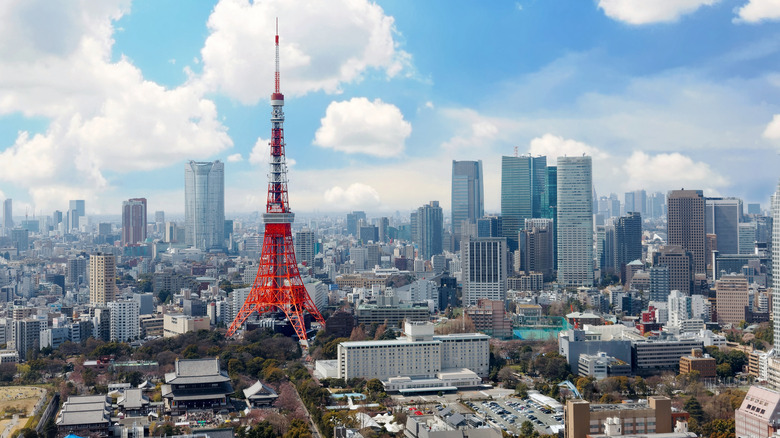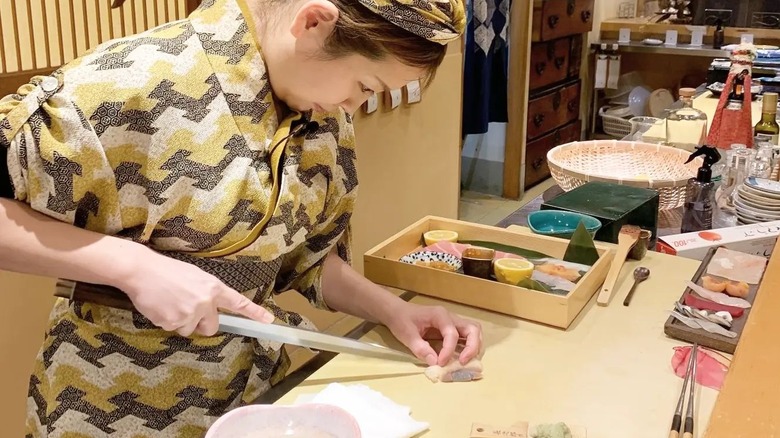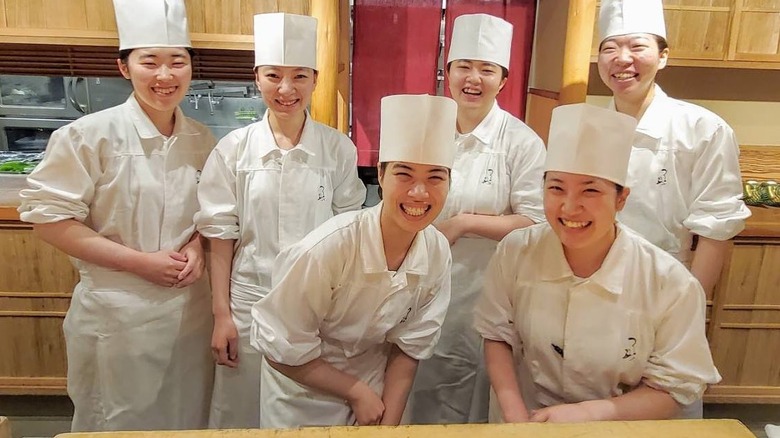The Tokyo Sushi Restaurants Run Completely By Women
During a 2011 interview with The Wall Street Journal, Yoshikazu Ono, son of Jiro Ono and heir to one of the most prestigious sushi restaurants in the world, was asked about the lack of female chefs behind the sushi counter — his answer was startling. "The reason is because women menstruate. To be a professional means to have a steady taste in your food, but because of the menstrual cycle, women have an imbalance in their taste, and that's why women can't be sushi chefs." Insider reports that the belief isn't uncommon in Japan, where other sexist myths — like the idea that women's hands, makeup, and perfume can alter the taste of fish — are widely accepted.
According to Mashed, the sexism perpetuated in Japan's sushi system stems from the traditional gender roles in that society. Despite having the third largest economy on the planet (per the BBC), Japan ranks 89th on the Women's Workplace Equality Index. In 2022, The World Economic Forum's Global Gender Gap Report placed Japan 116th out of 146 countries — the worst in East Asia. So even today, more than 10 years after Ono's quote, and with centuries worth of science debunking it, Condé Nast Traveler claims that, in a country with more than 30 thousand sushi restaurants, less than 10% of sushi chefs are women.
But that's not to say progress isn't being made. Tucked away in Tokyo's buzzing districts are a couple of sushi restaurants run entirely by women.
Nadeshico Sushi
Tokyo's Akihabara district is a hub for the city's otaku culture, a genre of Japanese pop culture associated with manga and anime (per Jobs in Japan). There, you will find many themed restaurants (also known as maid cafes) with waitresses dressed in costumes. Using the culture to their advantage, owner Kazuya Nishikiori told the BBC that they saw an opportunity to open a female-run sushi restaurant, Nadeshico Sushi, along one of the neighborhood's side streets. The vision came to life in 2010, making it Japan's first women-operated sushi restaurant.
The restaurant's manager, Yuki Chizui, spent six years as a restaurant hostess. There, she'd watch the male chefs from afar, dreaming of becoming a sushi chef herself one day. Nadeshico Sushi was her opportunity, but it didn't come without challenges. While most sushi apprentices train under a professional chef for about 10 years, Chizui's sushi master would only agree to teach her for two weeks. When she'd go to the Tsukiji Fish Market in downtown Tokyo, she told Condé Nast Traveler that the men refused to sell anything to her. Since then, Chizui secured the restaurant's weekly fish supply from a woman-owned fishing boat in the Yamaguchi Prefecture (via the BBC).
Chizui continues to hire and train the women who work at Nadeshico Sushi along with other aspiring female sushi chefs through the courses at her school, Next Generation Sushi Association.
Tsurutokame
Tsurutokame, which opened shop in Tokyo's Ginza district in 2016 (via Forbes), is a 100% women-run kaiseki restaurant owned by the restauranteur couple Harumi and Osamu Mikuni. Kaiseki is Japan's seasonal fine dining and is sought after by food lovers because it's one of the most technically challenging cuisines to prepare. As Mikuni told Forbes, it's unheard of for Japanese women to cook this way. "Sushi and kaiseki is a man's world. Even customers expect chefs to be men," she says. But Tsurutokame is something of a social experiment, one with the goal of bringing women to positions of status and power in Japan's food industry.
At Tsurutokame, the female chefs take center stage. The main dining room hosts 14 seats, all situated in front of the counter surrounding the open kitchen. Considered Japan's highest level of cuisine, kaiseki is regarded as an art form that traditionally serves 10 courses, ending with a hot cup of matcha. The head chef, Yubako Kamohara, leads a team of seven female cooks who help shop for ingredients and prepare and curate an ever-changing menu. Offering a truly one-of-a-kind experience, Be My Travel Muse found that reservations at Tsurutokame are often booked a month ahead — a sign that the Mikunis' experiment is working.


